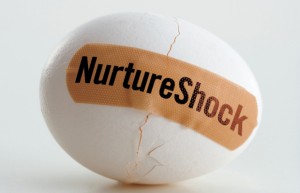
Upon learning I was pregnant with Ian, the first thing I bought was What to Expect When You’re Expecting. It helped pass the time during those interminable 9-and-a-half months. When he was a few months old, we borrowed Dr. Ferber’s sleep book to “Ferberiz” him and he dutifully learned to sleep through the night. The same techniques with Hugh failed miserably, night after screaming, tear-drenched night. (and yes, that was just me.)
My cousin Jane, who was done having her three boys before my first was born, sent me Penelope Leach’s common-sense book on childraising, to which I turned for episodic advice.
When the boys were older, I once bought a book on raising boys, but sent it to Goodwill after only a few chapters. I hated the gender generalizations, the silly social-work speak, and the faux philosophizing.
Parenting as a verb was not something I wanted to learn from a book. More helpful was advice from friends and family, and bitter/sweet experience gleaned from trial and error.
But I am currently loving the book Nurture Shock, which is reminiscent of a Malcolm Gladwell tome…but focused exclusively on child development. This is a highly readable, fascinating look at how children develop, backed up by social science.
The authors, Po Bronson and Ashley Merryman, look at modern “truisms” of parenting with a gimlet eye. Take our society’s habit of heaping praise on kids. Turns out to be a bad idea. Telling kids they’re so smart, they’re so athletic, they’re so gifted actually undermines their motivation. Better to say “You really worked hard at that.” E for effort, people, not E for existing.
The chapter is called “The Inverse Power of Praise.” Subtitle: “Sure, he’s special. But new research suggests if you tell him that, you’ll ruin him. It’s a neurobiological fact.” As my brother Tom says about the little trophies given to every single kid on a team, “When everybody’s special, nobody is.”
I first heard Bronson on NPR back in the fall, talking about why kids lie. The chapter’s teaser is: “We may treasure honesty, but the research is clear. Most classic strategies to promote truthfulness just encourage kids to be better liars. ” It was a fascinating interview.
Then there’s Why Siblings Fight. Very relevant reading. Freud’s family psychodrama theory is gonged by the authors. Sigmund’s contention that siblings fight because each kid never gets over being dethroned by the next? Wrong. Kids too close together? Not a factor. Kids too far apart? Not a factor.
“One of the best predictors of how well two siblings get along is determined before the birth of the younger child. At first glance, this is astounding – how can it be possible to predict a clash of personalities, if one of the personalities at issue doesn’t even exist yet? How can their future relationship be knowable? But the explanation is quite reasonable. It has nothing to do with the parents. Instead, the predictive factor is the quality of the older child’s relationship with his best friend.” As a parenting-book hater, I highly recommend Nurture Shock. And as a mom of boys ages 13, 15, and 18, I can especially recommend the chapter called “ The Science of Teen Rebellion.” What do you think of Nurture Shock? What’s your favorite/least favorite bit of advice from parenting tomes?